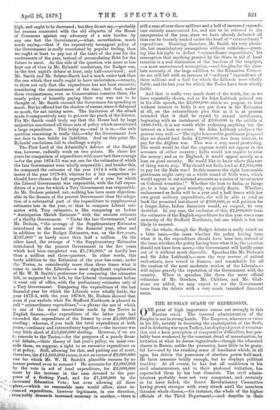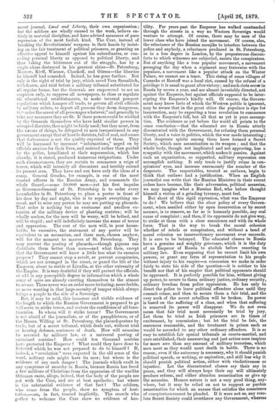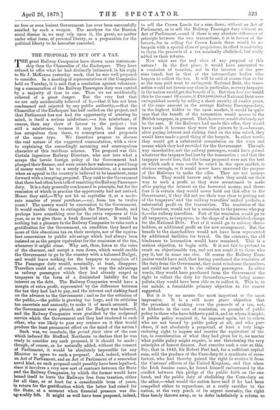THE RUSSTAN SPASM OF REPRESSION.
ONE point of high importance comes out strongly in this Russian crisis. The internal administration of the Empire is not in strong hands. The Emperor, who once or twice in his life, notably in decreeing the emancipation of the Serfs, and in declaring war upon Turkey, has displayed great determina- tion and a keen perception of comparative difficulties, has pro- bably been weakened by the constant dread of assassination, by irritation at what he deems ingratitude—though the educated classes in Russia, unlike the peasantry, have little to be grate- ful for—and by the crushing sense of loneliness which, in all ages, has driven the possessors of absolute power half-mad. He faces assassins boldly enough, but he displays political timidity. At all events, he has lost all confidence in his civil administrators, and to their profound irritation, has superseded them by his best Generals. The civil admin- istrators probably were not very competent, and certainly so far have failed, the Secret Revolutionary Committee having grown stronger with every attack until the members threaten whole classes,—for instance, the whole of the higher officials of the Third Department,—and describe in their secret journal, Land and Liberty, their own organisation ; but the soldiers are wholly unused to the work, believe en- tirely in material discipline, and have advised measures of pure repression of the most foolish kind. The Czar, instead of breaking the Revolutionists' weapons in their hands by insist- ing on the fair treatment of political prisoners, or granting an effective appeal to himself against his subordinates, or con- ceding personal liberty as opposed to political liberty, and thus taking the bitterness out of the struggle, has by a single ukase destroyed in his greatest cities—St. Petersburg, Moscow, Kieff, Warsaw, Charkoff, and Odessa—the liberties he himself had conceded. Indeed, he has gone further. Not only is the right of trial by jury, which saved Vera Sassulitch, withdrawn, and trial before a military tribunal substituted for all regular forms, but the Generals are empowered to act on suspicion only, to suppress all newspapers, to close or regulate all educational establishments, to make internal passport regulations which hamper all trade, to govern all civil officials by military orders, to deport all persons they deem dangerous, to " order the arrest of all personages whatever," and generally to take any measures they see fit. If these powers could be wielded by the Generals themselves who have held similar powers in occupied districts, they might be fairly used; but they must, from the nature of things, be delegated to men inexperienced in any government except that of hostile districts, full of zeal, and aware that forbearance is not the quality expected of them. They will be harrassed by incessant " informations," urged on by officials anxious for their lives, and resisted rather than guided by the police, humiliated at their supersession, which has already, it is stated, produced numerous resignations. Under such circumstances, they are certain to commence a reign of terror, which will intensify all discontent and terribly extend its present area. They have and can have only the ideas of a camp. General Gourko, for example, is one of the most trusted officers in the Russian Army, and commands the whole Guard,—some 50,000 men—yet his first impulse as Governor-General of St. Petersburg is to order every householder in St. Petersburg to place a porter in front of his door by day and night, who is to report everything un- usual, and to seize any person he may see putting up placards. That order is nothing but an enormous and needless ex- tension of the military device of planting sentries ; will be wholly useless, for the men will be weary, will be bribed, and will be stupid ; and will indefinitely increase the sense of terror and oppression. The cost of the men will, in poor house- holds, be excessive, the statement of any porter will be equivalent to an accusation, and these men, chosen anyhow, will for the moment be masters of St. Petersburg. They may prevent the posting of placards,—though pigeons can distribute them better than men—and what then, except that the Government will know a little less what its enemies propose ? They cannot stop a revolt, or prevent conspiracies, which are not arranged in the street, or guard the life of the Emperor, about to reside at Livadia, at the other extremity of the Empire. It is very doubtful if they will protect the officials, or add in any perceptible degree to information which a whole army of spies are already exerting themselves to the utmost to secure. There never was an order more irritating, more feeble, or more wanting in that large serenity of temper which always brings a people to the side of a Sovereign. But, it may be said, this immense and visible evidence of the length to which the Russian Government is prepared to go will serve to strike terror, and restore the confidence of all func- tionaries. In whom will it strike terror ? The Government is not afraid of the journalists, or of the pamphleteers, or of the Messrs. Willing of St. Petersburg, the placard-posters by trade, but of a secret tribunal, which deals out, without trial or hearing defence, sentences of death. How will assassins be arrested by military law, or a universal posting of
untrained sentries ? How could ten thousand sentries have protected the Emperor ? What could they have done to Solovieff which he was not prepared to do to himself If, indeed, a " revolution " were expected in the old sense of the word, military rule might have its uses ; but where is the evidence of any such danger ? The journals which exult in any symptoms of anarchy in Russia, because Russia has freed a few millions of Christians from the oppression of the warlike Ottoman caste, allege, indeed, that the body of the people are not with the Czar, and are at best apathetic • but where is the substantial evidence of that fact ? The soldiers, who come from the people, show no symptom of hesi- tation,—are, in fact, trusted implicitly. The crowds who gather to welcome the Czar show no evidence of hos-
tility. For years past the Emperor has walked unattended through the streets in a way no Western Sovereign would venture to attempt. Of course, there may be men of the lower class who have joined the movement. Of course, also, the reluctance of the Russian moujiks to interfere between the police and anybody, a reluctance produced in St. Petersburg, as in a less degree in London, by the preposterous discom- forts to which witnesses are subjected, assists the conspirators. But of anything like a true popular movement, a movement presaging the day when a regiment may fraternise with the populace, a movement like a popular attack on the Winter Palace, we cannot see a trace. This rising of some villages of Cossacks at Rostoff was a local riot, caused by the refusal of a privilege it is usual to grant after victory; and such riots omit. in Russia by scores a year, and are almost invariably directed, not against the Emperor, but against officials supposed to be inter- cepting the Emperor's kindly will. Of course, the Govern- ment may know facts of which the Western public is ignorant, may be aware that in the great cities the populace is ripe for insurrection, may be expecting a true revolution to commence with the Emperor's fall, but all that as yet is pure assump- tion. The evidence as yet before the world all points to the same conclusion—that the educated are in Russia utterly discontented with the Government, for refusing them personal liberty, and a voice in politics, which the war made interesting ; that desperate spirits among them have formed a Secret Society, which uses assassination as its weapon ; and that the whole body, though not implicated and not approving, has a sympathy with the movement, which makes it passive. Against such an organisation, so supported, military repression can accomplish nothing. It only tends to justify crime in con- spirators' eyes, and increase enormously the number of the desperate. The respectables, treated as outlaws, begin to think that outlaws had a justification. When an English journalist can write that the Russian Ministers in their recent orders have become, like their adversaries, political assassins, we may imagine what a Russian Red, who before thought himself a victim of a grinding tyranny, must feel.
But short of this rigid repression, what was the Emperor to do ? We believe that the clear policy of every Govern- ment, when assailed either by open insurrection or by secret menace, is to remove, so far as is humanly possible, any real cause of complaint ; and then, if its opponents do not give way, to strike at them with a clear conscience and with its whole force. That is the way to break the moral cohesion whether of rebels or conspirators, and without a bond of moral cohesion no insurrectionary movement ever succeeds. It is sure to be betrayed. The educated classes in Russia have a genuine and weighty grievance, which it is the duty of an Emperor of Russia to abolish before resorting to military law. Even supposing that he cannot limit his own powers, or grant any form of representation to his people without injury to his empire—a concession we make in order fairly to state his side of the question—it is neither to his benefit nor that of his empire that political opponents should be oppressed. It is perfectly possible for him, without giving up power, to secure to them ordinary justice, ordinary security, ordinary freedom from police oppression. He has only to direct the police to leave political offenders alone until they commit crime, and then to secure them a fair trial, and the very neck of the secret rebellion will be broken. Its power is based on the suffering of a class, and when that suffering is removed its power will disappear. We do not even mean that fair trial must necessarily be trial by jury. Let them be tried as Irish prisoners are in times of excitement, by commission ; but let the trial be fair, the sentences reasonable, and the treatment in prison such as would be accorded to any other ordinary offenders. It is as easy to establish fair special tribunals as courts-martial, and once established, their unswerving and just action soon inspires far more awe than any amount of military terrorism, which men meet as they would meet death in battle. There is no reason, even if the autocracy is necessary, why it should punish political speech, or writing, or aspiration, and still less why it should punish political action, either with vindictiveness or injustice. Let the discontented classes say their say in peace, and they will always hope their say will ultimately produce reform, and either abandon assassination or give up the assassins. Human nature is not a very good thing, any- where, but it may be relied on not to support or pardon assassination for which an excuse that satisfies the conscience of conspirators cannot be pleaded. If it were not so, any reso- lute Secret Society could overthrow any Government, whereas
no free or even lenient Government has ever been successfully assailed by such a weapon. The anodyne for the Russian social disease is, we may rely upon it, the grant, no matter under what form, of personal liberty, as a preparation for the political liberty to be hereafter conceded.




































 Previous page
Previous page